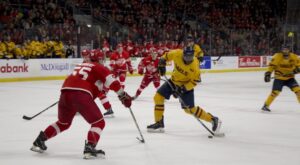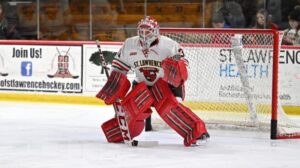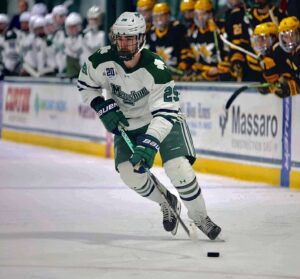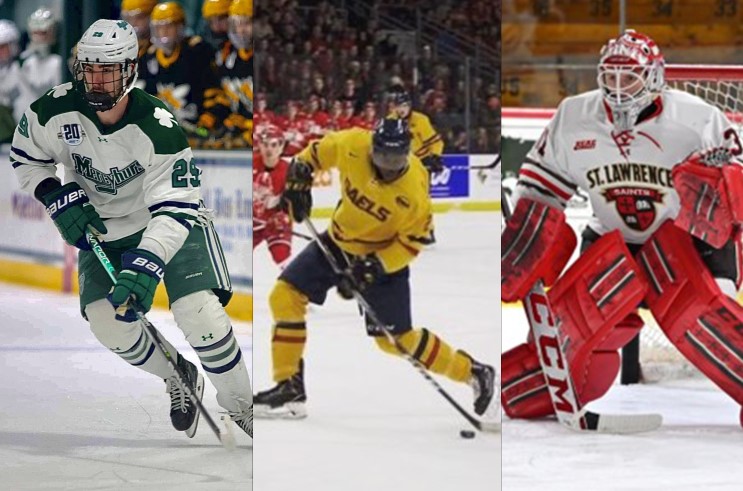By: Rowan McCarthy
In 2019, Adrien Bisson left the Ottawa Junior Senators a year before he had to and committed to playing for Maine in the NCAA. Bisson was a strong two-way defenseman at OJS and had been named one of the team’s alternate captains the year prior. During his three years at OJS, Bisson helped the team capture back-to-back Bogart Cups in 2017 and 2018.
The transition from the CCHL to the NCAA is never simple. The pace of play is faster and there are players there with higher levels of skill and experience.
In Bisson’s own words, “all those guys you play against were dominant players in juniors. You have to be on top of your game every night.”
As an incoming rookie, Bisson would have to fight just to stay in the lineup. To do so, he knew he would have to rely on everything he had learned while he was a member of OJS.
Junior hockey is a natural part of the progression of many young players careers. While they are developing as hockey players, they are also learning a great deal about themselves and life.
Talking with former OJS players, it immediately becomes clear that they view OJS as a place where they were allowed to grow as hockey players and people. They have taken what they learned during their time in the CCHL and are applying it in their lives today.
Hard Work
It will surprise no one that one of the things former players learned during their time with the organisation is the value of hard work.
Whether it was on the ice, in the community or just hanging out as a team Jaren Burke learned that the team would “get where we wanted to go if we were giving it 100 per cent.”
Burke played for OJS in both 2015 and 2016. As a self-described power forward with offensive upside, Burke thrived in a system that preached hard work. In the 2016-17 season, Burke scored 53 points in 62 games.
“I got to play with some really good players, and that kind of allowed me to do my role which was to bring energy, be physical and try to capitalize on scoring chances when I got my opportunities,” said Burke.
Burke was an alternate captain for OJS in the 2016-17 season. He said he always tried to lead by example with his work ethic. Come playoff time, that work ethic shone all the brighter. Over the course of his two seasons Burke amassed 29 points in 30 playoff games.
Burke went on to play two seasons at Rensselaer Polytechnic Institute in the NCAA before going to Queens to finish his bachelor’s degree in economics. “Getting to go there [Rensselaer Polytechnic Institute] and see the pace of play and to continue to pursue my hockey dream was an awesome experience,” Burke said.

He is currently taking part in the Toronto Maple Leafs’ Coaching and Management Development Program where he is learning about all aspects of how the Leafs’ organization is run.
“This year has really opened my eyes to the different opportunities available to work in hockey and some of the goals that I will continue to work towards,” said Burke.
He hopes to finish his MBA before taking up a career in some form of hockey management.
Burke and his family are incredibly grateful to have had the opportunity to play for OJS. “Marty Dagenais and the Ottawa Jr. Sens have been nothing but amazing to myself and my family while I was there and afterwards.”
Due to his experience, his family continues to billet players and attend OJS games.

Time Management and Support
At the NCAA level, time management away from the rink is just as important as learning to perform on the ice. Francis Boisvert learned this skill while he was playing for OJS during the 2017-18 and 2018-19 seasons.
One of many strong goaltenders who have come out of the province of Québec, Boisvert attended CEGEP while playing for OJS.
“I was going to school all day and practicing at night … I was pretty busy,” Boisvert said. “[I learned to] manage my time and dial it in while I was on the ice and forget about everything outside the rink.”
Boisvert played his first season for OJS as a backup. In 26 games he sported a .922 save percentage and a 2.00 goals against average. The next season he would take up the starting position.
“When the season ended, he [Martin Dagenais] told me, ‘You better be ready for next year because it’s your turn,’ and I took it very seriously,” Boisvert said.
As a starter, Boisvert recorded 31 wins out of 45 games played. He finished the season with a .920 save percentage and a 2.19 goals against average.

Boisvert felt that he achieved these fantastic results in part due to the help of his goalie coach Stéphane Levere.
“Stéphane knew I had the skills and the talent. He also knew that I maybe needed to work on my mental side a little bit,” Boisvert said. “It was a long season in that second year, and he was really there for me mentally.”
The relationship between Boisvert and Levere remains strong. They are still in communication about Boisvert’s play even though Boisvert no longer plays for OJS.
“If I’m going through a tough time on the ice and I need some advice, I give him [Stéphane Levere] a call, send him a text and he’s always there,” said Boisvert.
Boisvert currently plays for St. Lawrence University in the NCAA. He is finishing up a double major in business and economics with a sports science and exercise minor. While he has not yet chosen a subject, he will be attending Robert Morris next year to do graduate studies.
After completing his education, Boisvert intends to play professional hockey.
“Hockey has always been my dream, so I am still trying to make it,” Boisvert said. “If it doesn’t work out here, Europe is always a good option. I don’t mind travelling.”
Going outside your comfort zone
Bisson came to OJS as a member of the first Ottawa jr. Senators U18aaa team. Bisson described himself as a late bloomer.
“I did play AAA growing up, but I was mostly a third or second pair D-man,” Bisson said. “I didn’t steal the show or do anything crazy. I played sound defensively and moved the puck.”
Defense came naturally to Bisson. He was comfortable in a shutdown role where he did not draw too much attention to himself.

“With Marty, he expected a lot more out of me,” Bisson said. “I grew my game slowly into being more of a two-way defenseman.”
Bisson could not accomplish this on his own. He needed the guidance of the coaching staff to show him how to adopt a new style of play.
“Marty is a really approachable guy,” Bisson said. “He would give me pointers and say ‘give me this or that’ … We just got the best out of each other for all those years and I think everyone else felt the same way.”
In the final year of his CCHL career, Bisson scored 28 points in 51 regular season games. That same year in the playoffs he managed 8 points in 14 games. Not bad for a guy who entered the league not focusing on offense.
“My time at OJS really taught me to learn who you are as a player and then build upon it,” Bisson said. “You can always fall back to your base player, but you have to want more. You have to give more.”
Bisson went on to play hockey at the University of Maine. This year, he transferred to Mercyhurst University and has committed to play for the team next year as he enters his fifth and final year.
Bisson studied international affairs at Maine and transferred to Mercyhurst because of an interest in their intelligence program. Due to losing credits during the transfer, Bisson has switched his major to political science.
“I wanted to work in CSIS when I was younger,” said Bisson. “I’ve always loved anything international. I thought maybe I could do some embassy work.”
Bisson is keeping his options open. With one more year left in college he is unsure whether he will continue playing hockey or pursue something related to political science.
While the future may be up in the air, one thing Bisson is very sure about is how he got to be where he is. Like many of his teammates, he gives a lot of credit to OJS for his development as a member of their team.
“With OJS I built myself up to be the guy I am today,” said Bisson.















